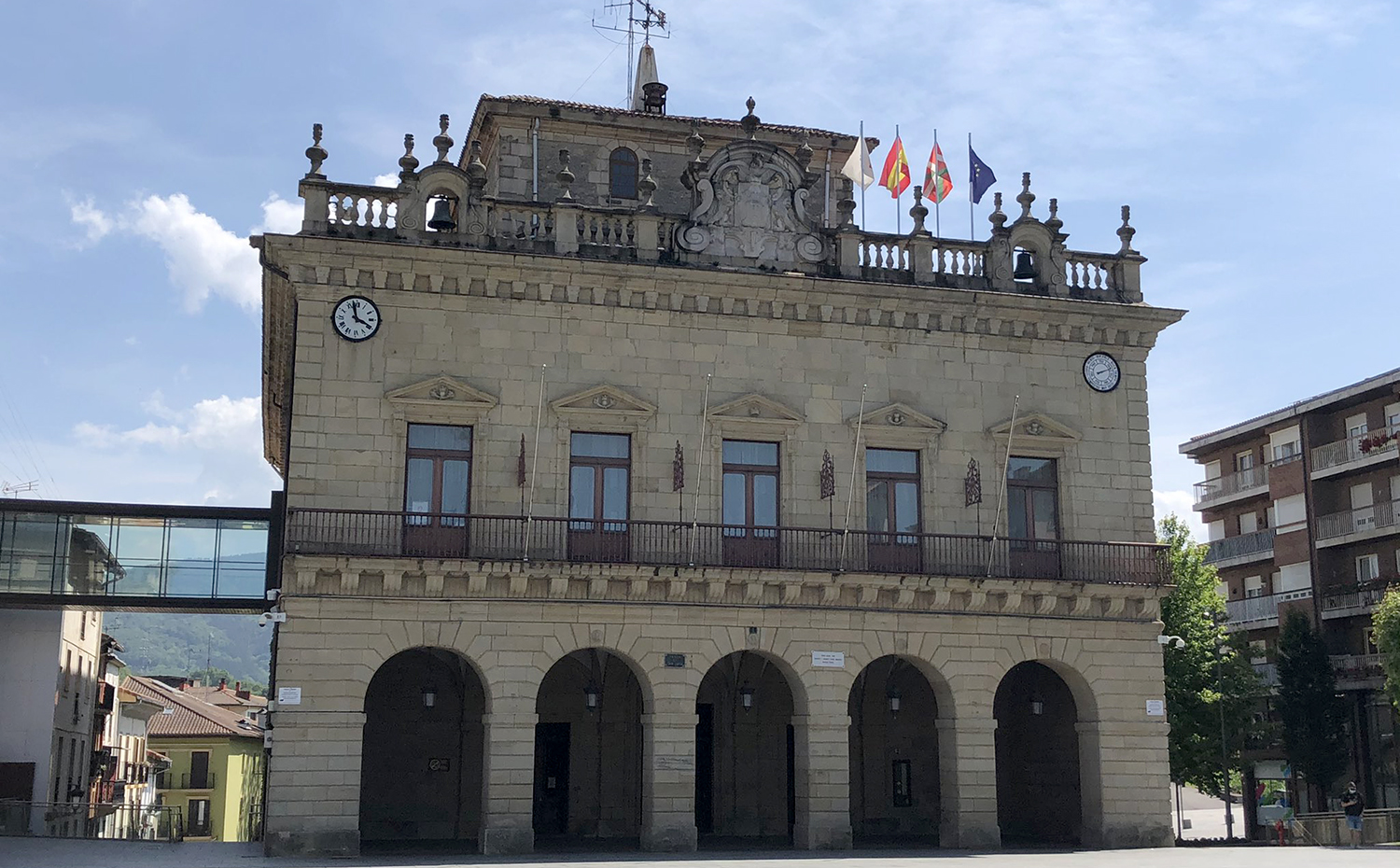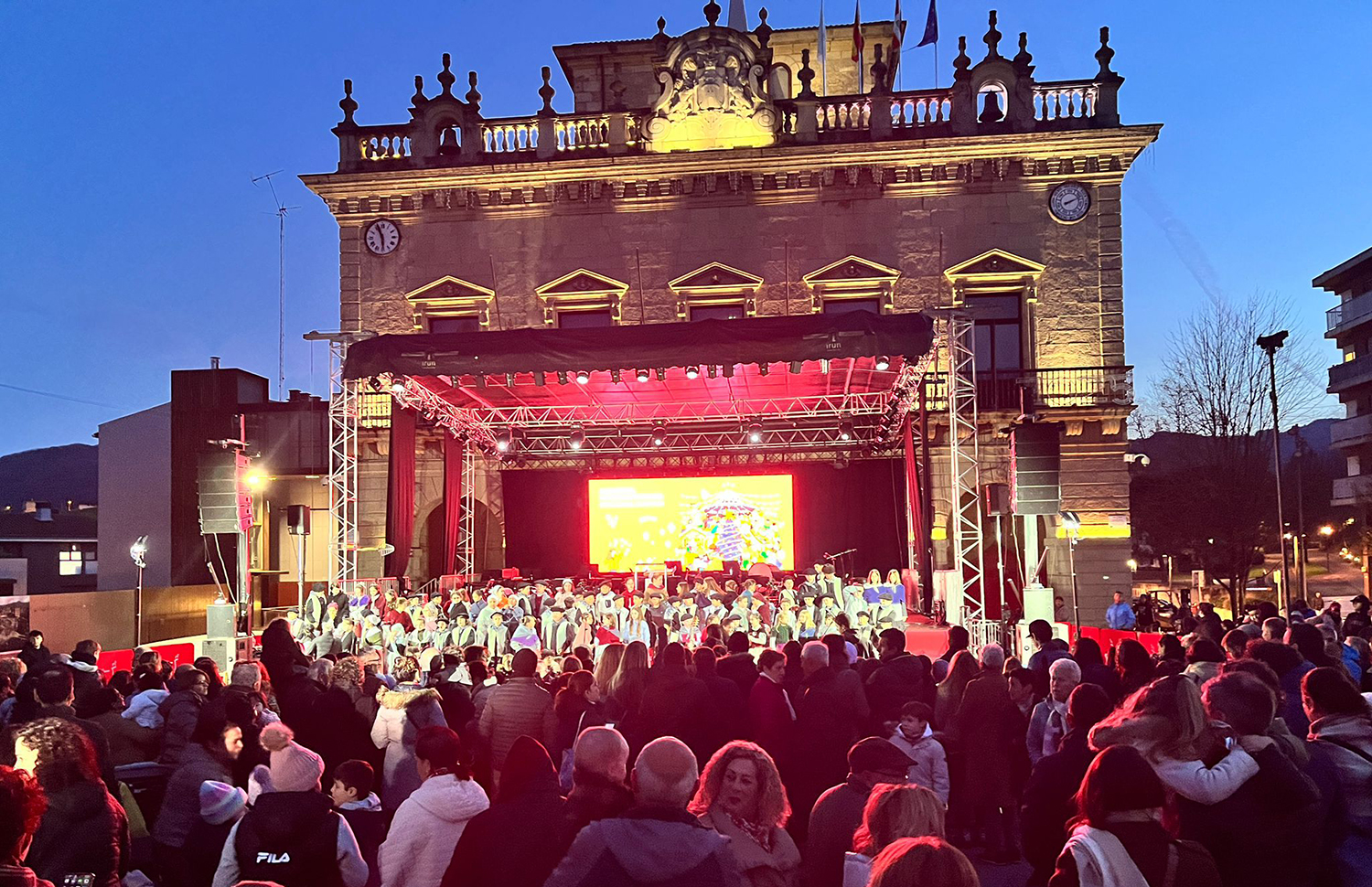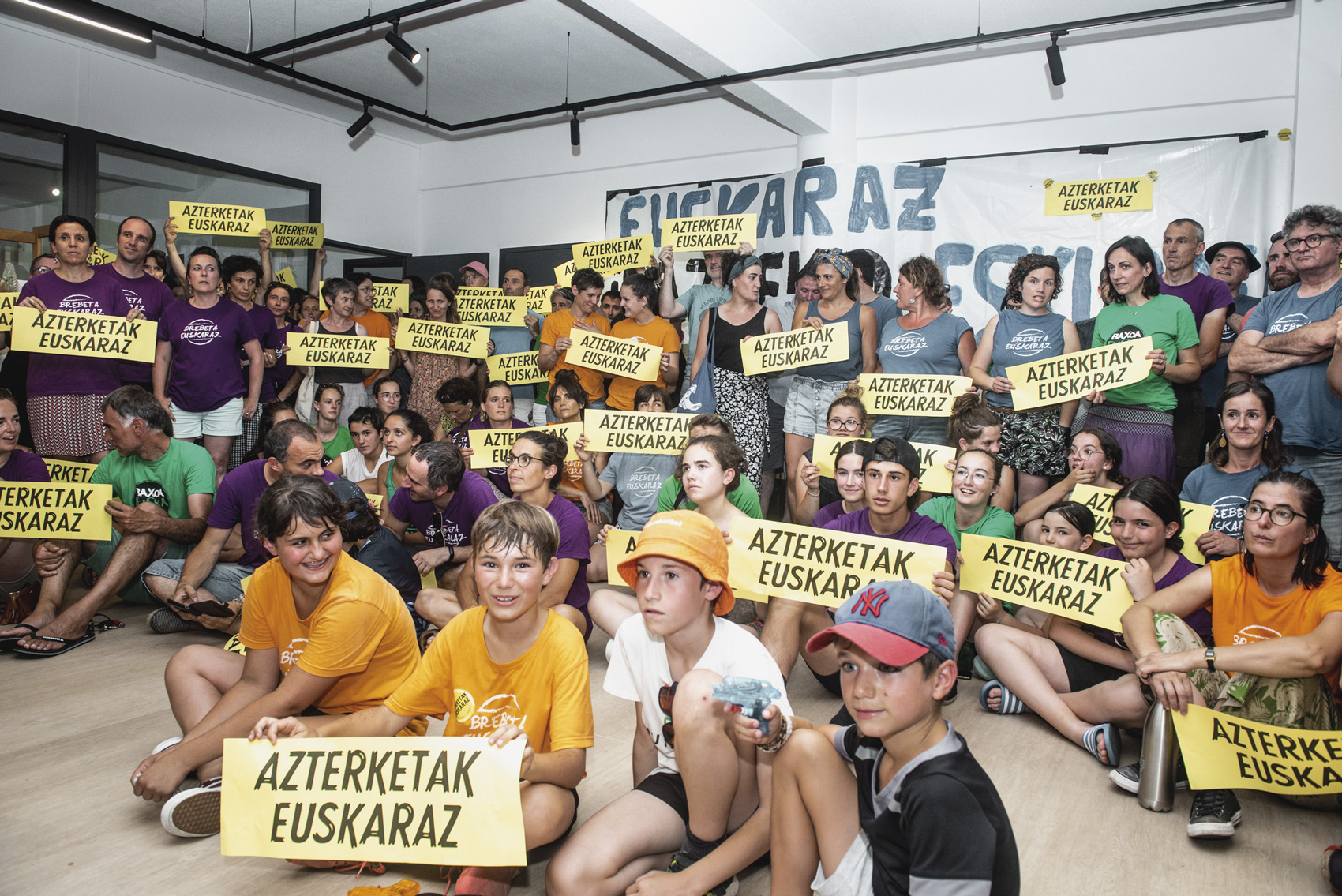"The activation of the Basque is a priority, no one will take the beans out of the pot"
- When the echo of the campaign led by Rikardo Arrangi came to his chest: Insignia “Euskaldunok euskaraz”. 50 years later, Patxi Baztarrika is calling on the Euskaldunes to speak in Basque, burned in the cold water of language politics.
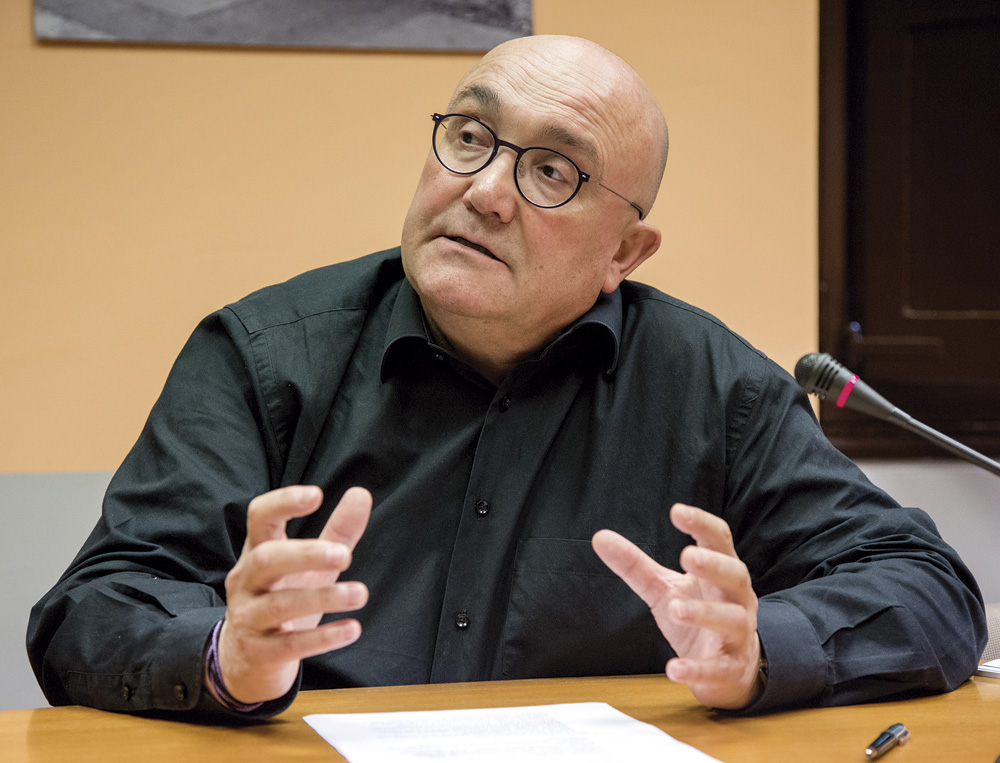
Filosofia eta Hezkuntza Zientzietan lizentziaduna, itzultzaile hasi zen Andoaingo Udalean 1981ean eta Euskara Zerbitzuaren teknikari arduraduna da egun. Tartean, Gipuzkoako Foru Aldundian jardun zuen eta Donostiako Udaleko zinegotzi ere izan zen. Eusko Jaurlaritzako Hizkuntza Politikarako sailburuorde izan zen 2005-2009 eta 2012-2016 legealdietan. NPLD Europako Hizkuntza Sarearen presidente izan zen 2015-2017 artean. Babeli gorazarre (Alberdania, 2010)
du argitaratua.
When you left the responsibility for language policy in 2016, you did not want to speak. Why?
It wasn't the time, it wasn't the time. So I decided. I appreciated the interview requests, but it was the time of the newcomers, more interesting to know what they said than what I could say. So I did. I now give a personal opinion, without compromising anyone else.
How do you remember the two times that you were a Vice-Language Policy Advisor, the eight years?
The two legislatures were very vivid. Nice and hard. It's topical to say that I had a great honor, but it's true, I had an honor, and luck, because I don't understand myself without the Basque. In those two legislatures, I had the opportunity to do my best for the life force of the Basque Country, a huge fortune and a great responsibility. Those of the second legislature were hard years, however, due to the economic situation. In the first legislature, we were able to make a significant budgetary leap, as far as Euskaltegis, the media and many agents of the Basque Country are concerned. It was an important step. In the second, however, we are faced with the most fragile economic era of the last thirty years, public resources were greatly reduced, and we had to set priorities, that is, the Basque Country, the media and the world of work. Despite the reduction in economic resources, they remained in the three areas and the projects already started were maintained.
What comes to the head of those two legislatures?
Many things come to my mind, and I am not going to make the list, but I remember the Euskara 21 of the first legislature, Bikain, Elebide, the equivalences of the Euskera titles… In the second, the document “And from now on, what?”, which we agreed with the participation of dozens of agents from different areas and which serves to lay the foundations of linguistic policy and the next two decades. It was unanimously approved by the Basque Advisory Council, after a very important participatory process. It seems to me to be of great value. Also the Txantxangorri of the Basque Country, which makes a permanent appeal to promote the use of the Basque Country, and which is recognized by all local institutions, Basque cultural activity and many social agents. Nor will I forget the Basque Day at the end of the legislature, “What can I do for the Basque Country?”, as we call on all the institutions and more than five hundred agents to commit to using the Basque country to answer the question. Mention should also be made of the place that the Municipal Law made to the Basque Country. Or that the public authorities of the three territories of the Basque Country have jointly carried out a Socio-linguistic Survey for the first time, including the implementation of the Euskera Indicators System EAS. In two words, or in one sentence, the linguistic policies of use, cooperation and consensus were of the two legislatures.
What do you say about the language policy of the mid-term legislature? I am referring to that of 2009-2012, in which was lehendakari Patxi López…
To some extent, those responsible for linguistic policy at that time used a different conception, although they did not stop in this, although they began to announce radical changes. I remember what I said at that time: there was a slowdown and a slowdown in language policy, especially in Osakidetza or in the consumer sector, as well as in the Euskaldunisation of adults. They gave their personal touch to what we were doing until then, but there was no 360-degree change, because it is impossible, because in our society, thanks to many, including the Socialists, we have achieved a high degree of consensus in language policy.
Despite the linguistic policies of collaboration and consensus, you received criticism…
Criticism is vital in public activity and must be accepted. For example, I have learned a lot from the criticisms… In the Basque world, social and institutional dynamics have been more differentiated than necessary, as if they were opposing things, and that is not what counts. The Basque country needs the social initiative, the private initiative and the public initiative of the public institutions. All three. In the Basque world, the political shock of these forty years has had its influence. A particular sector has defined its political strategy by denying institutionalization, denying legitimacy to institutionalization, and this political shock has been reflected in the Basque country; in a very special way, in the Basque country. In recent years the situation has improved and will be healthier in the coming years. That will benefit the Basque people. However, I also remember other criticisms. For example, we heard that making the Basque Government’s Strategic Agenda of the Basque Country was throwing money in balde, or when we started the “Aldatu txipa” campaign – I mean the activation of those who know Euskera, in order to encourage the first word to speak in Basque – we had to listen to very important things, which we were imposing the Basque and this and that. These too, of course, had their origin in the political clash.
The struggle between the parties.
In the opinion of our working group, we had an unbeatable attitude of collaboration and collaboration between different social partners, and I am very grateful for that, which enabled us to reach more agreements than ever, by area. We have worked closely with and in dialogue with most actors in the world of social culture. However, more can and must always be done. In any case, it is at the level of the Basque Country that the highest degree of agreement between public institutions and social agents materializes. Is there any degree of agreement, or greater, in the Basque Country somewhere else?
"The Basque Country is in the hands of the citizens, and this requires greater motivation from the citizens. The point to be prioritized is that of motivations, said in plural"
How do you see the current situation in the Basque Country? Is the same seen from the watchtower of the Vice-Ministry of Linguistic Policy of the Basque Government or from the Basque Department of the City Hall?
The same landscape does not look the same from the first floor or from the thirteenth. Characteristics and nuances are often very varied. On the one hand, and on the other, I see that Euskera is growing, whether in domestic transmission – and it is not mentioned many times – in knowledge – which is always mentioned – and in use. Euskera is a growing language. The Basque Country has had sustained growth during this 30 years, and in this case, the adjective is of great importance: the continuum. It is unparalleled in the world, as Miquel Gros i Lladós said. Use also grows, especially among young people, more in the formal public than in the domestic sphere. But that's not our specific characteristic, it's a normal thing. And it is enough to look at the case of Catalan, that is to say the situation of a language that has a better situation than ours. There is also a great difference between the use of public space and domestic use. This, as we know, is related to many factors and, among others, to the relative competence of language. The Basques, fortunately, are not monolinguals, and that is why we are talking about relative capacity, because we are talking about competition with another language. The relative competence of language is related to the first language, according to the studies. As for the Basque language, more and more people have Castilian and not Euskera as the first language. That is why I say that it is normal to use Euskera more publicly than at home. The Basque country has won many stages, is winning stages and will have to continue winning to win completely.
When to “fully win”?
Faced with two or three generations, the Basque country would be assured of survival. On the other hand, it cannot be said that it has its life force secured. The life force, the living language, is at stake, so that the Basque language is not a language rooted in the warm warmth of the corner. The Basque Country is in the hands of the citizens, and that requires motivation. The point to be prioritized is that of motivations, said in plural, as in the center there is not language, but the speaker, which entails an enormous complexity, as it means that emotions, sensations, joys and anger are played. When do you win? If we go back five or six decades, if we use perspective, we'll see that the '50s and '60s were the time of resistance. Then, the declining language began to rise, and then as it grew, it took the path of continued growth. Now we have to give sustainability to that continued growth. Of course, the situation is not uniform, the situation of the Basque Country in the CAV or the situation in Navarre and Iparralde is not the same, but since the CAV has an 85% weight in vasco-speakers, it corresponds to the work of traction. There is a spectacle of what will happen in the future. The work of the generations to come will be to give continuity to sustained growth, to give way to subordination.
In order to use the Basque language, he used “passive bilingualism”, “activation of the Basque speakers”, “attractiveness”, “attachment”… Also these sources of criticism.
These are key words! Passive bilingualism, for example, was why we made the concept known in the same legislature in 2005. Among others, Moreno is from Cabrera. He called Seskilinguism… Putting speakers who do not have a total capacity for Euskera in the bag of monolinguals is a strategic mistake. They must be given opportunities to approach the Basque dog. Now we want to activate the “belarriprest”, but it was criticized, they said it was to turn their back on the goal of the entire Basque, different visions were exposed and, in fact, all the criticisms and all the visions are legitimate. Criticism enriches and clarifies concepts, helps us evolve. Regarding activation, he was criticized for another concept... I have to say that the activation of the Basque has been a priority in my opinion, which is what we have to focus on, because no one is going to take the beans out of the pot. That is the reality. The criticisms also said that we were making the Basque guilty, because without a philosophy of guilt there are many difficulties in understanding reality, and a slightly greater secularization in this matter would not harm us. We do not seek the culprits, but the speakers: the Vasco-speakers who fulfil the conditions to speak in Basque. What a good thing to have the “ahobizi” move.

Attractiveness, adhesion…
For the Basque country to continue to win, it needs an advanced and active linguistic policy, legal support, commitment and continued action of public institutions… All of them are absolutely necessary. However, without attractiveness, without popular adherence, the Basque country has a party, a party! “We are in Euskal Herria, it is our language, we have the right… the rest are nonsense!” The graves are full of reasonable people. A long time ago, I read Txepetxe -- perhaps in Arrasate Press magazine -- who wondered: “For Euskera to advance, what does it take? That the Basque is a duty or a pleasure?” His answer, “pleasure”, without belittling “duty”. Many have done the same thinking, but otherwise. I remember in the beautiful novel Mussche, by Kirmen Uribe, Robert asked: “What moves the world? Economy, power or love?” To which he replied: “Loves.” Of course, on one occasion, or on more than one occasion, Euskera will also have to be a duty, we know that, but the activity of Euskera has to be attractive, even when it is not obligatory for its use.
What is the leadership of the authorities with regard to Euskera in general?
In the last three decades the Basque Country has made an impressive record, and that would not have been possible without an advanced linguistic policy. The one who doesn't want to see is blind. The path that has been taken in the CAV for the revitalization of language is impressive. There is nothing else to do with what has happened in Navarre and Iparralde, where for many years very different language policies have been adopted. As in other public activities, the leadership and leadership of the public authorities is essential. When we talk about language, we not only talk about language, but about the coexistence of a society, the model of a society. And the determination of that is for those who have a legitimate popular representation. I do not want that responsibility to fall to anyone other than the legitimate representative of the people, for the representatives of the people to refuse to do so. Nor would I want it not to be a strong social initiative for the promotion of the Basque country. I believe that the public authorities really live with the responsibility of the Basque people, who know that there is no turning back, that the Basque people must be at the centre of public policies. There is something to be improved, not least, but the Basque road in the three territories of the CAV shows how the commitment and leadership of the Basque public authorities is. As for the leadership of the public authorities, I believe it is key that their leadership be as transverse as possible, that is, that in this leadership those responsible for the different areas of the public institutions are involved to the maximum. For example, Health Advisor Jon Darpón. That citizenship has the right to be attended in the language we want is evidence. It is undeniable that we have to take more and more steps to guarantee the right. I am glad not only to say that to the Health Advisor, but also to say that the Basque country has to have more weight in the health services, precisely because the Basque country serves to increase the empathy between the doctor and the patient, improving the quality of the service. It seems to me to be a very important argument and a perfect example of transversality. Even when we talk about the digitization of the industrial fabric of the Basque Country, one of the main challenges of today, there is also language policy. There has been and is strong leadership in language policy at the CAPV. As for the cross-cutting approach, it needs to be improved and strengthened. The authorities should bear in mind one thing: the best way to carry out this leadership would be for them, too, in their day-to-day life, to open the door for the Basque language to be the language of communication. That would be the biggest leader in the overall classification.
"The best way to realize the leadership of the authorities would be for them, too, in their daily lives, to open the door to a language of communication. That would be the strongest leadership."
Why doesn't he speak Basque?
It does!
OK! Why does the Basque who does not speak Basque not do so?
Euskera lives in the company of another language; next to Spanish, in our case. The language that is also here, the Spanish language, and the first language of most of those who live here. It is also the first language of many Euskaldunes: it is the first language of half of the Euskaldunes under the age of forty. In addition, this language is one of the five or six strongest languages in the world. In addition, the multilingualism of our society, globalisation… the influence of this language is much greater. Moreover, the Basques, fortunately, are at least bilingual and we know how to speak in that language. In addition, the relationship between Euskera and Castilian is unequal, to the detriment of the Basque country. The Spanish has an enormous hegemony, dominates our customs. The Basques are becoming more and more, but a large part of the Basques live in places where the knowledge of the Basque country does not reach 50%. In other words, we have difficulties and difficulties in use. The Basque Country has long lived in a situation of subordination, and this leads us to take this situation of subordination as normal to ourselves. All the factors are there, if Euskaldunes are going to speak in Basque, they have to choose between doing it in Basque. To increase the use of Euskera, we need at least two things: to speak – that is, “opponents”, not only of Euskera – and to have spaces of use, of possibilities. We need both.
Is choosing to defend?
I think that is a way of saying the same thing in a different way.
I remember what Carme Junyent told us at the same ARGIA. “Language kills indifference.” Koldo Mitxelena was “indifferent”.
I totally agree. Sometimes I start the lectures by asking: “What are the deadly factors that lead to the deactivation of a language?” Audience answers: turn your back on your own language, find no utility for communication. When that happens, the transmission of the house is interrupted, no elections are made… To win, we know, legal support, linguistic policy, the commitment of public institutions and authorities… But they are not enough either. Pedro Miguel Etxenike also said: “The most necessary thing is the desire to be Basque. Will. We need to remain Euskaldunes. To do this, it is essential to use Euskera, now and always, here and there”. It says: “The Basque needs you.” It's the opposite. “I need the Basque.” At another time, I wrote in Hermes magazine: “What the Basque needs is that we need it.” If we need Euskera, it will go ahead!
As the Hermes magazine mentioned, with the constitution of the Basque Government, language policy was part of the presidency. In some forums, such as that of the journal Hermes, centrality was called for for for linguistic policy. What is the place of linguistic policy within the structure of a government?
The Basque country needs centrality, I would also say it is essential. The location of the Department of Linguistic Policy in Lehendakaritza would be an aid, and very appropriate, because language policy does not end in culture and does, on the contrary, extend to all areas of society and governments. However, location is not a panacea, which will not cure all of our disabilities and diseases, as other examples show. The means should not become objectives. Location helps, but it's not a panacea. For example, in 2013 the government, with the leadership of lehendakari himself, elaborated the Euskera Strategic Agenda for the legislature, which involved all government departments, and the VPL was not presidents.
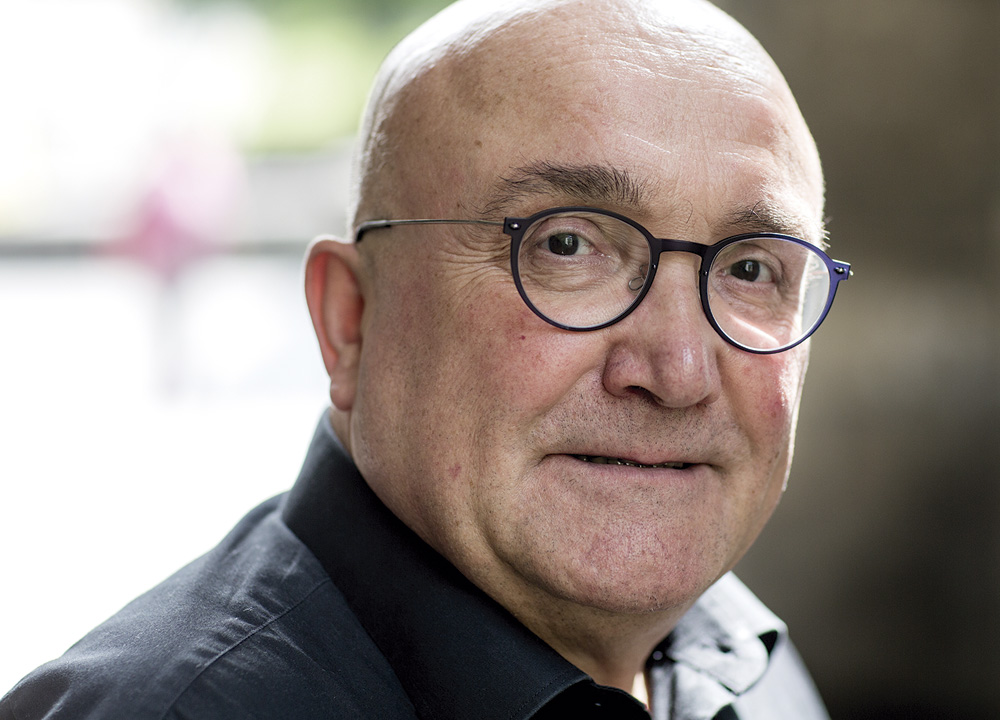
What are the current challenges of Euskera and the challenges of the future?
I am not going to tell you all that is contained in the document ‘And from now on, what?’, adopted unanimously by the Advisory Council of the Basque Country and approved by the deputies and the Basque Government and by many social and very important agents of the Basque Country. There are the challenges. When we talk so much about cooperation and consensus, we should take advantage of this document. To mention the most important challenge, however, the important thing is for the Basque question to be placed at the centre of the social agenda, effectively, not symbolically. I have talked about the social agenda, not the political agenda, because we have confined ourselves to that. The Basque country should appear more strongly on the social agenda, because it has a weak presence, today, in our social agenda. There are many social actors, trade unions, companies, associations… who are convinced that the Basque issue does not belong to them. Anjel Lertxundi said: “It is necessary that the issue of Euskera be not only of the Euskaltzales but of the whole society.” Ramón Saizarbitoria said: “What Euskera needs is that, although nationalists do not give up on Euskera, non-nationalists also do so.” This is one of the main challenges facing Euskera. If the Basque country is going to go ahead, it is up to us to nurture the social and political consensus around the Basque country. No, however, to have reasonable correspondences, but for the Basque Country to make progress!
Let the main challenge be at the heart of the social agenda, not the only challenge, of course.
Not the only one. The Basque country has other challenges on another level: to increase the number of Basque speakers, to increase their use, and what is key is that the people who have the Basque language as the first language keep it in their usual practice – without subordinations to the Spanish language, I mean, without subordinations to the Spanish language – that the Basque people do not use it as a cohesive language, that the Basque parents transmit it in the Basque home. The Basque without the influence of Castilian is not possible. That is out of the question. We have to flip that idea, because Castilian can be a cane on our way, because we're looking for speakers, speakers!, not titled or cum laude. Use entails wear and tear and we must not fear it. Another thing is disuse erosion. Wearing down does not mean giving up quality and excellence, no. Quality and excellence yes, but not in all speakers, writers, professors, communicators… We must banish red pens and hypercorrections. The late Karmele Rotaetxe said that we had to make the Basque easier. And he was right, I wanted to put the communicative point of view above the grammatical perspective. And if we look for a speaker who has to choose, it's better for the Basque to be a convenient and easy tool. In the case of our language, between now and a few tenths there will be typical Castilian parishioners, but, nevertheless, it will be the majority who have Castilian as the first language. We need courage to accept this reality – after we know it – because otherwise we will not put our language into progress. In cross-cutting challenges, we must mention motivation. As the speaker will have to choose, in the case of minority languages it is necessary to have linguistic awareness. Not, in any way, linked to a concrete political ideology, but to a social project: the responsibility to keep the language collected at home, the desire to maintain the uniqueness of a plural society, identity, pragmatism… We relate linguistic awareness with elements of this type. I see no other way for the Basque language to become our national language. If not, the Basque language, at best, will be the language of a tribe, a subordinate language, not a national language. And the attitude is also there, I mean a positive attitude, or Koldo Mitxelena once said that his was “critical optimism.” We have to see and be optimistic about the path that the Basque country has taken in recent decades! At the same time, we must see and be critical of this path. Critical optimism, therefore, without an attitude of agony, because pessimism and agony do nothing but throw people out, and we are looking for speakers, as I said before. Society is full of people who have an attitude “Yes, but” towards the Basque country, and these must be brought to the side of the Basque country. That is my opinion.
What do you say about the Spanish political parties which say about the autonomic linguistic policies, which always want to cut the wings of the Basque country?
Risk of involution. In the Spanish State, the legal asymmetry in terms of plurilingualism is that which exists at the state level. Spanish is the official language of the State, the rest are official in their respective communities. The Spanish asymmetry, on the contrary, is symmetry in the Communities, as a result of the Constitution and the Statutes of Autonomy. For example, the Basque language is not official in the CAPV “together with the Spanish”, but “as the Spanish”. Euskera and Castilian have legal symmetry in the CAV. Involution comes from wanting to asymmetrically make the symmetrical situation of communities, from wanting to impose the supremacy of Castilian. The debate is not new. Citizens, for example, want to change the Spanish status of the public employee, where it is said that in communities that are two languages, knowledge of that community language will be compulsory or essential in certain jobs. Citizens would like the knowledge of Euskera, Galician and Catalan in some cases to be compulsory, to remove it from the law of the State!, so that knowledge of these languages can be valued in some cases as meritorious. But that is unconstitutional! It is unconstitutional because Article 3 of the Constitution stipulates that in communities where a language other than Spanish is spoken, the official language of one's own languages shall be governed by the Statute of Autonomy. The Constitution itself says so! The law of the Basque Country was transferred to the Constitutional Court in 1986 and in one of its legal bases it states that there is no inconvenience in requiring the knowledge of the Basque Country in certain jobs and that in all others it is valued as merit. Citizens are against the Constitution and constitutional doctrine! On the other hand, it opposes Article 10 of the European Charter of Languages and the four times that the Council of Europe has sent the Spanish Government to determine in its peripheral administrations which job it must ensure knowledge of the language concerned. The European Charter is not a political desideratum, it is an international pact, it has the force of law, the Spanish State is obliged to comply with it. Recently, the State Administration has called for an OPE to fill 4,500 jobs, of which 340 are in the CAV. Under no circumstances is the knowledge of the Basque Country guaranteed. This does not correspond to the European Charter, to what the Council of Europe says, or to the judgment of the Constitutional Court of 1986, which stated that the Basque Country was official in the CAPV as Castilian and, therefore, in the jobs called by the central administration to this Community, in certain jobs, it had to ensure, under the law, the knowledge of the Basque Country. They are unconstitutional! It is worrying, because if the Citizens' initiative were to flourish in the Congress of Deputies, as the law of the Public Employee Statute is the Spanish basic law, it would be applicable throughout the Spanish State and erode a power that the Constitution itself had given it. I hope that the main parties in Spain will not agree, that they will see the light and that they will not open the door to the initiative of Citizens.
From Etxepare's first book, we moved forward with Euskera. Is it up to us to always be around with the Basque Country?
Chomsky said: “The future of small languages cannot be predicted, it is in the hands of the citizens.” That's why it's up to us to flip and spin. Or what Fishman said. “We are the only guarantee of our language.” We need to go around! You have to choose! The activation of Euskaldunes, the activity of languages, has kept the Basque alive. How, if not! Such a key concept in its simplicity is not today's. I didn't forget it when I was ten years old, I started high school, I gave it to the college of the Benedictine in Lazkao, and I took the metal emblem on my chest: “Euskaldunes in Basque”. In order to alphabetize the Euskaldunes, the green insignia was an element of the campaign that Euskaltzaindia launched in 1967, promoted by Rikardo Arrangi. The motto of the campaign was: “Euskaldunes in Basque: writing, reading, speaking”. Then came the well-known and resounding statement of Joxean Artze: “A language is not lost because those who do not know it do not learn it, but because those who know it do not use it,” or some poems of Gandiaga: “But even if we know here / in Basque / who does not speak in Basque / does not leave us / does not let us speak in Basque”). All the demands to awaken the linguistic awareness of the Basques. Because it is the speakers who are the saviors that the Basque needs... The speaker of the Basque future will have more possibilities of use than he has done so far. There will also be more areas of use. From being a minority in the vasco-speaking society, the monolingual Castellanospeakers will become a minority. Many will know the Basque country, to a greater or lesser extent. In any case, we will be strong, and yet we will have to choose between speaking in Basque. More can be done than today, but it will have to be done. They will always need policies of promotion, commitment from the authorities, social agenda … but they will demand that these opportunities be exploited, and in order to take advantage of them, they will have to be chosen. And that's related to motivations, to linguistic awareness -- and that's a very complicated thing. We will have to learn how to manage the situation positively and not agonically. That's where we played a lot. You cannot associate Euskera with anguish, anguish, title, because people are going to escape us! We will have to learn to prestigious the use, not only for knowledge to be an instrument of communication in the future, although it will always be linked to consciousness and, precisely for that reason, it will be complicated. The key will be that this is manifested in a positive way. I remember what Bernardo Atxaga said when he entered Euskaltzaindia: “I don’t mind being a language in crisis, if this crisis lasts for five thousand years.” That's it.
“Beste hizkuntza politika bat gauzatu zuten, aurrekoarekin eten gabe ere, nahiz eta errotiko aldaketak iragarriz hasi ziren. Geldotze bat gertatu zen hizkuntza politikan, bereziki nabarmena Osakidetzan edo kontsumo arloan, baita helduen euskalduntzean ere. Baina ez zen 360 graduko aldaketarik izan, gure gizartean, askori esker, baita sozialistei esker ere, adostasun maila handia lortu baitugu hizkuntza politikari dagokionean”.
“2016an, herritarren %62k egokitzat jo zuten Jaurlaritzaren hizkuntza politika, desegokitzat %19k. Bost urte lehenago baino 13 puntu gorago baloratu zuten gure talde lana. Zifrak ez ziren ohikoak kolore jakin bateko gobernuaren lana baloratzen baitzuten. Hamabost urtean egindako neurketa guztietako zifrarik altuenak ziren, lurraldez lurralde orekatuak, erdaldunen eta euskaldunen artean ere orekatuak. Gizartearen ia bi herenek zer motatako hizkuntza politika egin behar den seinalatu zuten. Aprobetxatu behar diren erreferentziak eman zituzten, kontsentsu politiko eta soziala hain beharrezko den arloan”.
Gabonetako argiak pizteko ekitaldia espainolez egin izanak, Irungo euskaldunak haserretzeaz harago, Aski Da! mugimendua abiatu zuen: herriko 40 elkarteren indarrak batuta, Irungo udal gobernuarekin bildu dira orain, alkatea eta Euskara zinegotzia tarteko, herriko eragileak... [+]











